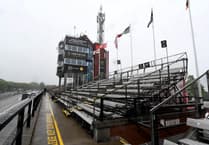Thirty years ago this week, 10 young riders from New Zealand completed a remarkable achievement in the 1994 Supersport 600 TT.
The NZ Auto-Cycle Union team, all newcomers with the exception of Robert Holden, managed to complete the four-lap 151-mile race intact, all achieving 100mph laps in the process.
Fresh out of the crate, the 10 YZF 600 Yamahas were bog standard, with only minor safety modifications permitted (ie removing wing mirrors, lights and side stands).
This considerable feat of engineering and rider reliability earned them the Maudes Trophy, a prize treasured in the competition world of team endeavour.
More than $750,000 NZ had been invested by various offshore and local New Zealand corporations and organisations to make the challenge possible.
The team of Doug Bell, Russel Josiah, Blair Degerholm, Jason McEwen, Hugh Reynolds, Paul Williams, Chris Haldane, Anthony Young, Nathan Spargo and the aforementioned Robert Holden.
Four other Kiwis came across that year to make their TT debuts, namely Loren Poole, John Hepburn, Andrew Stroud and Stephen Briggs, plus Mike Willemsen who had ridden the previous year.

Experienced road and circuit racer Glenn Williams had two top-15 finishes in the F1 and Senior.
No fewer than 15 New Zealanders in the Supersport 600 race alone out of an entry of 88.
Hepburn received the scholarship ride arranged by John Shand, president of the New Zealand ACU at the time, who co-ordinated the trip and put the deal together with Yamaha for the bikes.

Noel McCutcheon, a leading rider from New Zealand in the late 1950s, was appointed team manager and 1954 Junior TT winner Rod Coleman came over to support the team.
Not surprisingly Holden was the leading finisher in ninth place at an average speed of 111.73mph. An experienced and highly-respected road racer, he won the following year’s Singles TT but tragically lost his life approaching Glen Helen during an early morning practice session for the 1996 event.
Four places behind him in the 1994 race, McEwen was the star of the newbies, lapping in excess of 112mph and averaging 110.79mph to finish 13th. Haldane was 30th, Josiah 44th, Spargo 46th, Young 49th, Williams 53rd, Reynolds 55th, Degerholm 61st and Bell 62nd of the 68 finishers at an average speed of 98.61mph for the four laps.

‘I almost goosed it for the team,’ said Degerholm, who has lived in the island for more than 20 years.
‘McEwen was off the wall, fast everywhere, so we all knew he would be the quickest.
‘I went in too hot at Waterworks 2 on the first lap and ran wide on the exit, hitting a bale.
‘The bike lost all power and I came to a halt on the climb out of the corner. I looked all round and found a couple of wires hanging down on the left side that had been ripped out.
‘They were the wires for the side-stand sensor (leftovers from the stand that had been removed).
‘I lost a lot of time while I spliced the wires back together, but it ensured that I finished and we completed the challenge.’
Degerholm [his grandfather was Finnish], was hooked by the TT and racing in the British Isles generally. ‘The TT opened up to me the level of racing and the standard of kit and bikes kit, which was a step above what it was back home in New Zealand.’

He based himself in Buckinghamshire for a while and raced for Honda Ireland in the following year’s TT.
Sponsored by Douglas businessman Richard Turner of Intersport on a Kawasaki ZX6 in the British Supersport Championship, he won both the MRO and ACU Powerbike Championships in 2000.
The same year he rode a Wilson & Collins Kawasaki 750 to seventh place in the Senior TT (becoming the fastest Kiwi on the Mountain Course at that time in the process). A few weeks later he won the Southern 100 Solo Championship after a terrific battle with Ian Lougher.
Degerholm’s racing career came to an abrupt halt in a collision at an end-of-season British Supersport event at Donington Park when Steve Brogan pulled up close to the Dunlop bridge on the warm-down lap to do a permitted practice start ahead of him.
Blair severed the nerves of his right arm in the incident and has not raced since. He has resided in the island since 2002.

McEwen attempted to qualify on the spare Britten vacated by Holden after Mark Farmer tragically crashed the Italian BRS version in the Thursday afternoon session. Newcomer was McEwen needed to complete two laps on the bike, but it failed on the second circuit at Crosby.
A precocious talent, he raced at various levels Down Under but sadly never returned to the TT.
He was fortunate to survive a serious crash at Taupo in 2004, suffering massive injuries, but defiantly made a comeback the following year in the Robert Holden Memorial meeting at the Cemetery Circuit where he finished third and fourth in the Formula One races.

Poole, a test rider and technician on the Britten project, finished 15th in the 1994 race on a CBR Honda, Stroud 26th on a Yamaha bought for him by Des Collins after he had arrived in the island, scholarship recipient Hepburn 28th and Willemsen 40th.

Stroud won the Battle-of-the-Twins at Daytona on a Britten four years in succession (1994-1997).
He competed in 41 World Superbike races, 20 FIM 500 GP races, four Suzuka Eight Hours (one with Graeme Crosby) and is now retired from racing with 10 children!

The Maudes Trophy challenge was established in 1923 as an impartially-observed endurance test for motorcycles, the first winner of the was the rider (or riders) of a 500cc Norton that averaged 64mph for 12 hours at Brooklands.
In May 1973, two BMW R75 road bikes were ridden continuously round the Mountain Course for a whole week, day and night.
Last year, two electric DSR motorcycles were ridden between four points in the UK in 60 hours.




